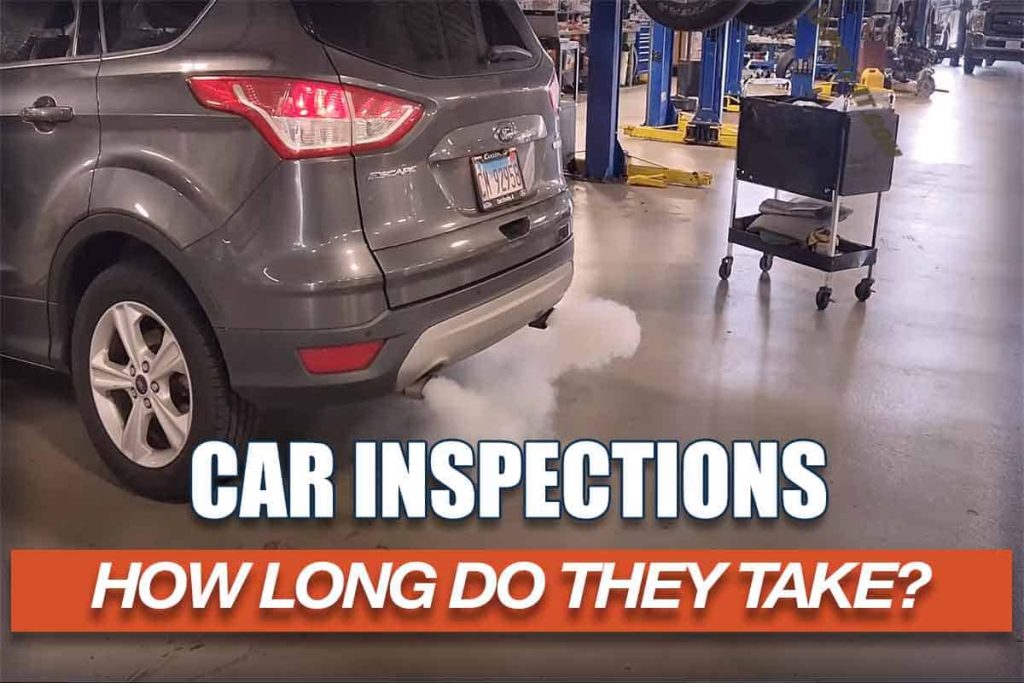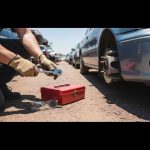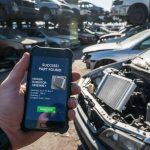If you’ve ever pondered, “How long does a car inspection take?” you’re not alone. This article unravels the complexities of vehicle inspections, from safety checks to emissions tests. Discover what factors can extend the inspection time, how to prepare, and why it’s crucial for both safety and environmental reasons.
Demystifying Car Inspections
“Knowledge is power, especially when it comes to vehicle inspections.”
Ever found yourself wondering how long a car inspection takes? You’re not alone. This guide aims to answer that question and more, providing you with the knowledge you need to navigate your next inspection with ease.

Average Car Inspection Duration: A Breakdown
Typical Standard Inspection Time
A plain old car inspection? That’s a 15 to 30-minute job, tops. But don’t make plans just yet.
Car Type and Duration Variation
Your ride matters here. An SUV or a luxury car might need an hour or so. But a compact city car? You’re looking at less than half that time.
- Compact cars: ~20 minutes
- Sedans: ~30 minutes
- SUVs/Luxury cars: ~60 minutes
Car Condition Impact on Inspection Length
Got a beater? Brace yourself for more minutes, even hours, of inspection. A well-maintained whip can breeze through in no time.
Types of Inspections: More Than Just a Quick Look
Understanding the types of inspections can help you gauge how long the process might take. Generally, there are three main types:
- VIN Inspection: Validates the Vehicle Identification Number (VIN) to ensure it matches your registration.
- Safety Inspection: A thorough check of safety features like brakes, lights, and windshield wipers.
- Emissions Inspection: Measures the pollutants your car emits to ensure it meets environmental standards.
Safety Inspections: What’s Checked?
- Brake System: Inspectors look for worn-out brake pads and any leaks in the brake fluid.
- Lights and Signals: All lights, including headlights and turn signals, are checked for functionality.
- Tire Condition: Inspectors examine the tread depth and look for any signs of damage.
Emissions Inspections: The Two Main Types
- Tailpipe Test: Measures pollutants directly from the exhaust pipe.
- OBD Test: Uses the car’s onboard diagnostics to check for emissions-related issues.

Inspector Expertise Role
The inspector’s skill level is key too. A seasoned pro can zip through the process in under an hour. Newbies might need a few extra days to get it right.
So, how long does a car inspection take? It’s like asking how long is a piece of string – depends on various factors!
Ever wondered, “how long does a car inspection take?” Well, several factors can influence this.
Vehicle Inspected Age and Model
Firstly, the vehicle’s age and model play a big part. Older cars might need more time for inspection due to wear and tear over the years. On the flip side, newer models could be quicker thanks to their up-to-date features.
- Old car: More time due to possible issues.
- New car: Less time because of modern tech.
Factors That Affect How Long a Car Inspection Takes
Several factors can influence the duration of your car inspection:
- Type of Inspection: Safety inspections are generally quicker than emissions tests.
- Vehicle Condition: A car in poor condition may require more time for additional repairs.
- Inspection Center: Some centers have more inspectors available, reducing wait times.
| Factor | Typical Duration |
|---|---|
| Safety Inspection | 20-30 minutes |
| Emissions Inspection | 30-45 minutes |
| Additional Repairs | Varies |
Preparation: The Key to a Swift Inspection
Being well-prepared can expedite the inspection process. Here’s how:
- Documents: Always bring your vehicle registration and proof of insurance.
- Routine Maintenance: Ensure your car has recently been serviced.
- Check Engine Light: If it’s on, get it checked out before the inspection.
Pro Tip: Opt for an appointment during off-peak hours to minimize wait time.
Common Pitfalls: Why Cars Fail Inspections
Cars can fail inspections for a variety of reasons:
- Faulty Emissions System: Issues with the catalytic converter or oxygen sensors can lead to failure.
- Worn-Out Tires: Bald tires are a safety hazard and will result in a failed inspection.
- Malfunctioning Lights: Broken or dim lights are a common reason for failure.
“An ounce of prevention is worth a pound of cure. Regular maintenance can save you time and money during your next inspection.”
Emissions Tests: Clearing the Air
Emissions tests are crucial for environmental conservation. Here’s what you need to know:
- Warm-Up: Drive your car for at least 20 minutes before the test to ensure accurate results.
- Engine Health: Address any engine issues before the test to avoid failure.
State-by-State Guide: Navigating Different Requirements
Different states have unique requirements for vehicle inspections. For instance:
- California: Requires biennial emissions tests.
- Texas: Mandates annual safety inspections.
The Financial Aspect: What Will It Cost You?
The cost of a car inspection varies by state and can range from $20 to $100. Always budget accordingly to avoid surprises.
Understanding what a Car Inspection involves
What is an inspection?
An inspection is a comprehensive evaluation of a vehicle to ensure it meets specific safety and emissions standards. It is usually mandated by state or local governments to ensure that all vehicles on the road are safe and environmentally friendly.
What steps are taken in a car inspection process?
The car inspection process typically involves a series of checks, including visual inspections and mechanical tests. The vehicle’s identification number (VIN), brakes, lights, emissions system, and other safety features are examined to ensure they meet state requirements.
What elements of your car are inspected?
Various elements such as the brakes, lights, windshield, emissions system, and safety features like seat belts are inspected. The specific elements can vary by state and the type of inspection being performed.
Who is the inspector during a car inspection?
The inspector is usually a certified professional trained to perform vehicle inspections. They are well-versed in state and local regulations and are authorized to issue inspection certificates or stickers.
What is a typical car safety inspection process?
A typical safety inspection involves checking the vehicle’s brakes, lights, windshield wipers, and other safety features. The inspector may also check for any structural issues that could compromise the vehicle’s safety.
How long does a Car Inspection take?
A standard car inspection usually takes between 30 to 45 minutes. However, this can vary depending on the type of inspection and the specific vehicle being inspected.
Why does car inspection take that long?
The time is needed to thoroughly check all the vehicle’s critical systems and ensure they meet state regulations. This includes both mechanical and emissions tests, which can be time-consuming.
What can make the car inspection take longer?
Factors like the vehicle’s age, the type of inspection, and the inspector’s schedule can extend the time required for a car inspection. Older cars may require more time due to potential issues.
Does the duration of car inspections vary by states?
Yes, the duration can vary by state due to different inspection requirements. Some states may require more comprehensive inspections, which can take longer.
How long does the emission system inspection take?
An emissions system inspection typically takes about 20-30 minutes. This involves checking the vehicle’s exhaust system to ensure it meets environmental standards.
How to prepare your car to minimize inspection time?
To minimize inspection time, make sure your car is in good condition. Check the lights, brakes, and emissions system beforehand. Also, ensure all required documents are ready to expedite the process.
What happens if your car fails the inspection?
If your car fails the inspection, you will usually be given a specific period to fix the issues and get the vehicle re-inspected.
Why might your car fail the inspection?
Common reasons for failing include issues with the emissions system, faulty brakes, or non-functioning lights. Structural problems can also lead to a failed inspection.
Can a car fail the inspection for lack of vehicle registration or proof of insurance?
Yes, lack of proper documentation like vehicle registration or proof of insurance can result in a failed inspection.
What happens to the inspection sticker if a car fails inspection?
If a car fails inspection, the existing sticker is usually invalidated, and a new one is not issued until the vehicle passes re-inspection.
What to do when a car fails the state inspection?
When a car fails state inspection, the first step is to address the issues that led to the failure. Once these are fixed, the car must be re-inspected.
How to get your car reinspected after failure?
After fixing the issues, schedule a re-inspection with the same or a different certified inspection center. Some centers offer free re-inspections within a certain period.
Busting some myths about Car Inspections
Can car inspections be done at car dealerships?
Yes, many car dealerships offer inspection services, especially for used cars. However, it’s essential to ensure they are certified to perform state-mandated inspections.
Can you drive a car that’s failed its inspection?
Generally, you cannot legally drive a car that has failed its inspection until the issues are fixed and it passes a re-inspection.
Do you need a driver’s license for a car inspection?
In most states, you do not need a driver’s license for the vehicle to be inspected. However, you will need valid identification.
What states require annual safety inspections?
States like New York, Texas, and Pennsylvania require annual safety inspections. The requirements can vary by state.
Is the inspection of brakes mandatory in all states?
The inspection of brakes is generally mandatory in all states that require a safety inspection. However, the specific tests may vary.
Accessing and understanding your Car Inspection Report
What does a car inspection report include?
A car inspection report typically includes details of all the checks performed, the condition of various vehicle components, and whether the car passed or failed the inspection.
How do you read your car inspection report?
The report is usually straightforward, listing each inspected element and its condition. Look for sections marked “Fail” to understand what needs to be fixed.
When should you get your vehicle re-inspected?
Re-inspection should be done after fixing all the issues listed in the failed inspection report. Some states have a specific timeframe for re-inspection.
Can you dispute an inspection report?
Yes, if you believe the inspection was not conducted correctly or the findings are inaccurate, you can dispute the report by following the state’s appeal process.
What to do with your car inspection report?
Keep your car inspection report for your records. It may be required for future inspections or when selling the vehicle.
How long does a car inspection take?
A typical car inspection can take anywhere from 30 minutes to an hour. However, this depends on various factors such as the type of vehicle and the inspection checklist used at the inspection station.
What is the process to get a car inspected?
To get your car inspected, you typically need to make an appointment at an auto inspection station. You may need to provide proof of insurance and wait for an inspector to perform a thorough review of your vehicle according to the state’s department of transportation.
Is a safety inspection required for all types of vehicles?
The requirements may vary. Not all types of vehicles require a safety inspection. Some states may exempt certain types of vehicles. It is best to check with your state’s department of transportation for the specific requirements.
What happens if my car fails the vehicle inspection?
If your car fails the vehicle inspection, you will typically be required to have the issues repaired and get your vehicle inspected again. Until then, it could be illegal for you to use the vehicle.
Does every state require a car to undergo inspection?
No, not every state requires a vehicle inspection. While many states have such requirements, there are some where the state doesn’t require it. Even if your state doesn’t require it, getting an inspection for your vehicle can be beneficial to ensure safety.
What is inspected during the brake inspection?
During the brake inspection, the inspector checks the condition of the brake pads, discs, fluid, and lines. Any signs of excessive wear or damage could cause the car to fail the inspection.
What is the purpose of an emissions system inspection?
The purpose of an emissions system inspection is to ensure that your vehicle is not emitting too many air pollutants. This is an essential part of the car inspection in many states, considering the environmental implications.
Can I use my used vehicle without getting it inspected?
While it depends on local laws, most states require used vehicles to pass a safety inspection before they can be used. Therefore, it is recommended to get an inspection for your used vehicle to ensure its safety and legality.
What exactly is inspected during a vehicle inspection?
During a vehicle inspection, an inspector examines several components of the car based on an inspection checklist. This usually includes brake system, lights, horn, mirrors, steering system, windshield wipers, and tires. The emissions system may also be checked, depending on local regulations.
How do I prepare for a car inspection?
Prior to getting a car inspection, check common issues like lights, tire pressure, and windshield condition. Make sure your car is clean as dirt or clutter might hinder the inspection process. And of course, be prepared to provide your insurance proof, registration, and identification.




